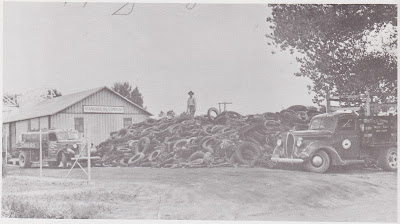 |
| Charles Soper graduated early from the Colorado School of Mines to join the army air corp. |
My grandparents said Charles was buried in Denver. I was surprised and asked why we never had gone to see the grave? They didn't know; by that afternoon we were driving around Fairmount Cemetery. We asked the main office for a map and they put an "x" on the map for where the plot was located. As we drove to the location, my grandparents made comments like, "This doesn't look right, the pine trees were tiny." Asking when they were last there, the said, "1945, for the funeral." Over 65 years later, trees had grow up.
As we walked around the location, we didn't see the grave. I got to noticing there was a line of markers and then none for a while. Looking at the map and hearing my grandparents say in the background it was between two pine trees, I decided "x marks the spot" and pulled out my Swiss Army knife and sunk it into the grass. (To this day I still don't know why I decided to do that) The blade hit something hard. It was like a scene from MacGyver! I cut a piece of sod and began to see a letter appear - S, then O - P - E - R! We pulled a bottle of water from the car and uncovered and washed the rest of the marker. It had sank 2 inches below the grass. My grandparents contacted the cemetery and the marked was lifted to regulation height.
As we approach the 71st anniversary of VJ Day, we must never forget those who gave the ultimate sacrifice and the families who carry the heavy hearts for the nation. It is to those who have worn the uniform that I salute.




